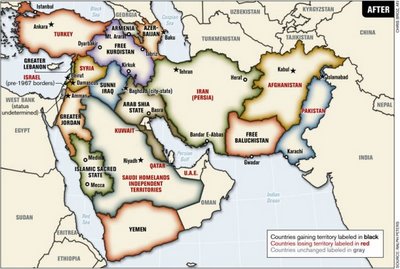 In an article for the US Armed Forces Journal, Ralph Peters provides an argument for divying up the Mideast to reflect the realities of tribal and blood relations. The map that he provides displays a vastly different Mideast that seems more geared to reflect US economic and geopolitical interests than the purported desire to alleviate fratricidal tensions that Peters argues for. But who knows? ...
In an article for the US Armed Forces Journal, Ralph Peters provides an argument for divying up the Mideast to reflect the realities of tribal and blood relations. The map that he provides displays a vastly different Mideast that seems more geared to reflect US economic and geopolitical interests than the purported desire to alleviate fratricidal tensions that Peters argues for. But who knows? ...
Peters writes: Correcting borders to reflect the will of the people may be impossible. For now. But given time — and the inevitable attendant bloodshed — new and natural borders will emerge. Babylon has fallen more than once.
What is somewhat strange about this map is that its publication comes on the heels of whispers from within the White House that President Bush is considering partitioning Iraq. Could Peters have some insider sources that are feeding him information that he's dressing up in ethnographic-type argumentation?
Meanwhile, our men and women in uniform will continue to fight for security from terrorism, for the prospect of democracy and for access to oil supplies in a region that is destined to fight itself. The current human divisions and forced unions between Ankara and Karachi, taken together with the region's self-inflicted woes, form as perfect a breeding ground for religious extremism, a culture of blame and the recruitment of terrorists as anyone could design. Where men and women look ruefully at their borders, they look enthusiastically for enemies.
From the world's oversupply of terrorists to its paucity of energy supplies, the current deformations of the Middle East promise a worsening, not an improving, situation. In a region where only the worst aspects of nationalism ever took hold and where the most debased aspects of religion threaten to dominate a disappointed faith, the U.S., its allies and, above all, our armed forces can look for crises without end. While Iraq may provide a counterexample of hope — if we do not quit its soil prematurely — the rest of this vast region offers worsening problems on almost every front.
I must admit that I'm sympathetic to Peters' humanitarian interests. Yet, I think that his own sentiments might play little part in the big picture that the Cheney/Rumsfeld global plan for the Mideast envisions. Certainly, there's something compelling about the idea that the US' interests in the region is set on its own best interests and not the hegemonic pretensions of an empire.
Monday, August 21, 2006
The Shape of the New Mideast?
Subscribe to:
Post Comments (Atom)






No comments:
Post a Comment